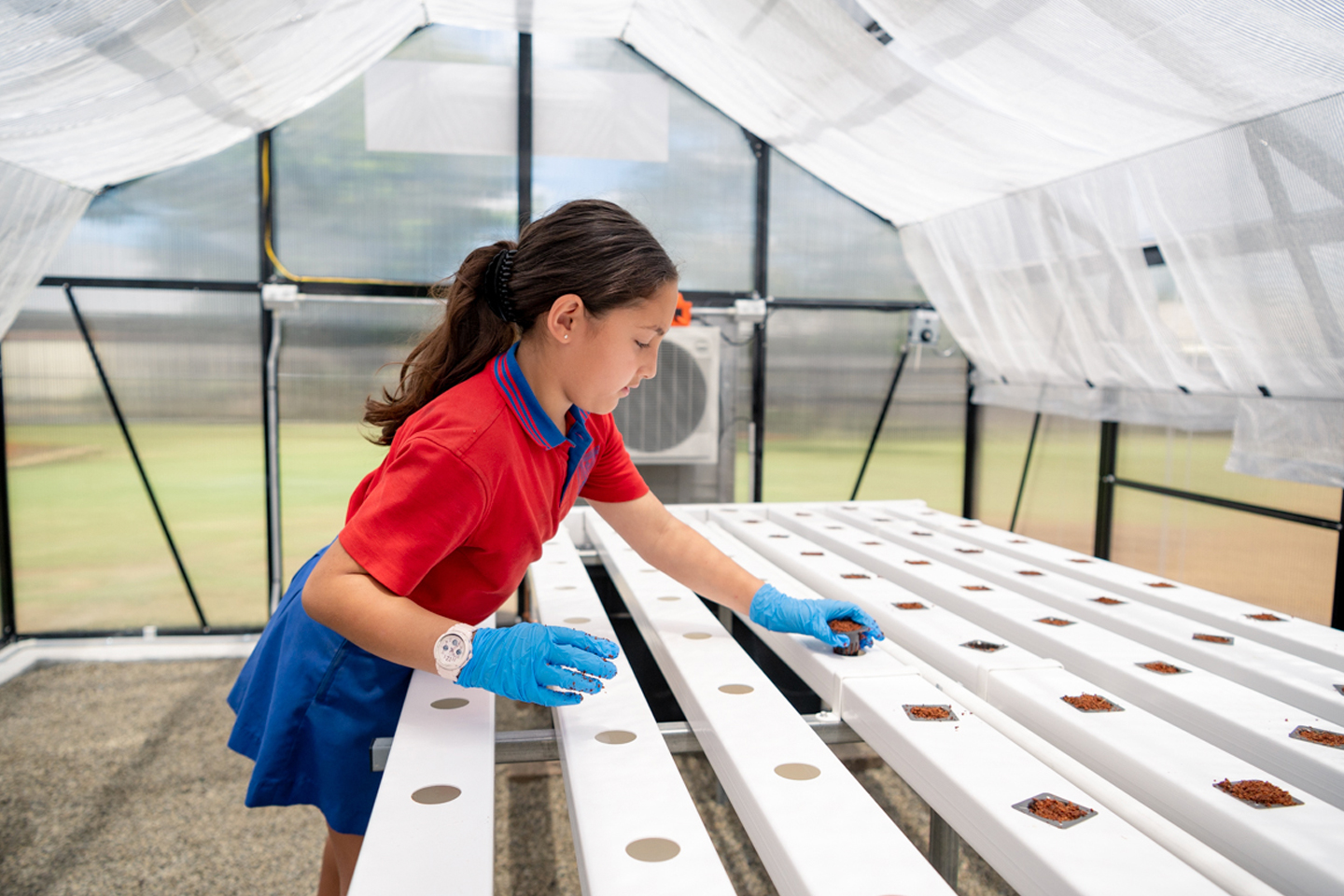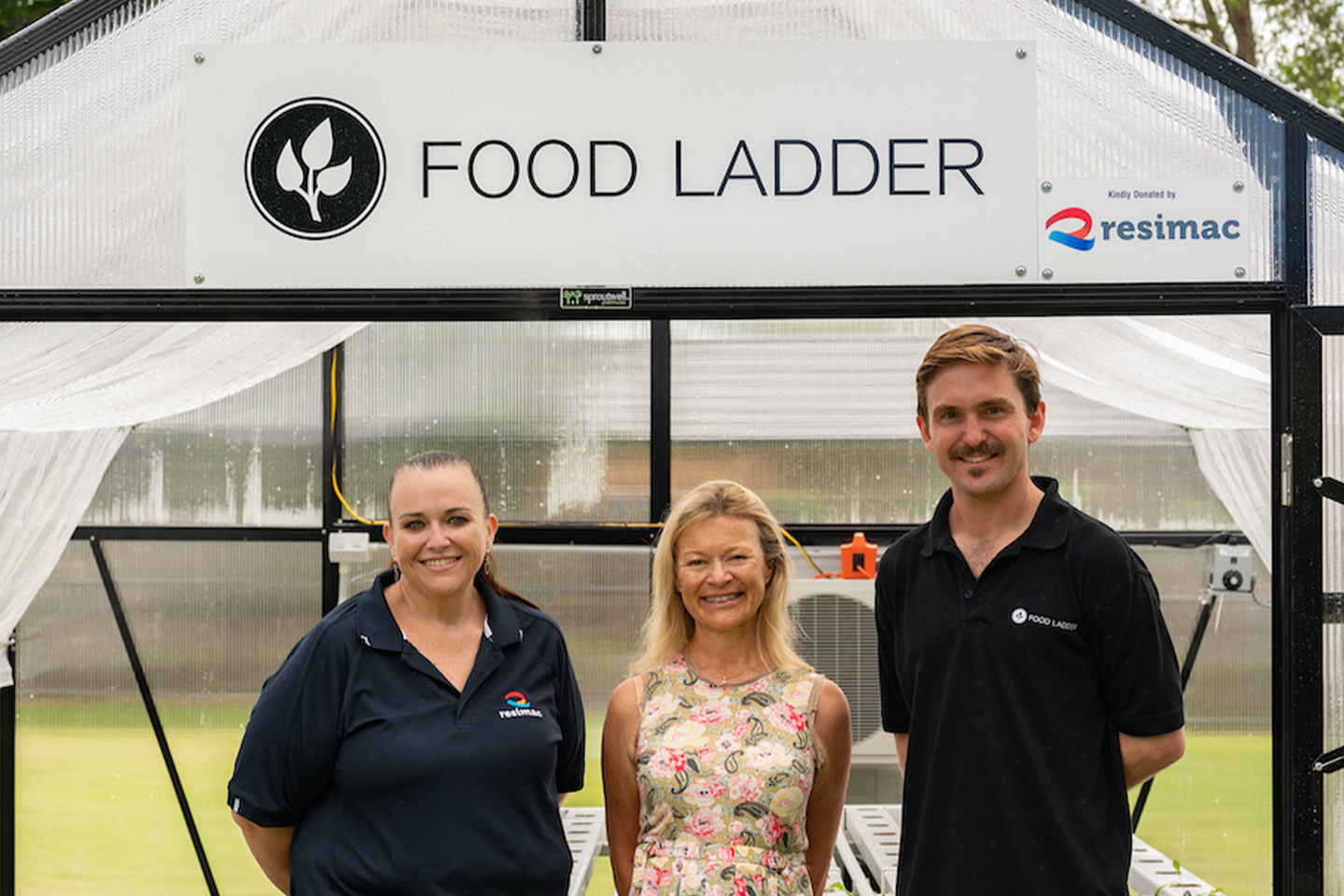
Resimac partners with Food Ladder to help bring horticulture, food security and nutritional education to schools in remote, regional and disadvantaged communities
Resimac has partnered with Food Ladder to roll-out a multi-school fresh food sustainability initiative throughout Australia. The project will initially see Food Ladder's greenhouse systems installed in three schools over the next 12 months. Earlier this week, the first greenhouse was installed in Waterford West State School.

The students at Waterford West State School interacting with their new Food Ladder greenhouse.
What is Food Ladder?
Food Ladder is a not-for-profit social enterprise that addresses food security challenges around the world. Locally, its key focus is extending the life expectancy of indigenous Australians, where, according to the latest figures from the Australian Bureau of Statistics, almost half of Aboriginal men and over a third of women die before they turn 45.
Teaching healthy habits from a young age is one of the avenues the not-for-profit is pursuing to achieve its goal. Food Ladder's School System range of growing systems combine a climate-controlled hydroponic greenhouse with STEM-aligned educational resources that teach children about horticulture, nutrition and commercial enterprise.
Each hydroponic greenhouse sees plants grown in a solution of water and nutrients to accelerate their growth, and are five times more productive than traditional farming methods when operating at full capacity.
To date, Food Ladder systems have been installed in seven schools throughout Australia, as well as in India, Bhutan and Afghanistan. It is looking to roll these out in a further 14 schools in 2022, with the priority on reaching scale in high-needs schools in remote indigenous communities. It is also exploring additional avenues for transforming the supply chain to provide access to fresh produce for remote, regional and disadvantaged communities.
Food Ladder has also installed community-owned systems in places like Katherine and Tennant Creek in the Northern Territory, providing those areas with access to affordable fresh produce, as well as employment and training opportunities. A typical system produces enough fresh, nutritional food and vegetables to supplement the diets of 250 local people, or tens of thousands of serves of vegetables a year.
According to the Federal Government's 2020 Report on Food Pricing and Food Security in Remote Indigenous Communities, the large distance that fresh produce has to travel in remote areas makes it costly, with a basket of healthy food purchased in a remote store costing 56% more on average compared to a district centre supermarket. This has led to a deterioration in healthy food habits, with only 8% of indigenous Australians meeting the recommended vegetable intake guidelines.

Janelle Packman (Resimac BDM), Susan Hansen (Resimac Board member) and Tate Brammer (Head of Operations at Food Ladder) in front of Waterford West greenhouse.
Why has Resimac partnered with Food Ladder?
Scott McWilliam, CEO of Resimac, said the primary schools project formed a key part of the 'social' factor within Resimac's ESG framework.
"Food Ladder's vision of empowering communities with the tools to stop hunger and malnourishment, using Australian research, innovation and design, is truly inspirational. We are honoured to be one of a select few organisations that Food Ladder has chosen to partner with to help bring this dream to life.
"The next generation of Australians face a number of challenges, but none more fundamental than food security and malnutrition. We want to help set our kids up for success in the future and give them the tools to be able to make better choices, which means a holistic approach that focuses on both healthy bodies and healthy minds," said Mr McWilliam.
Of the partnership with Resimac, Ms McJannett said Food Ladder was delighted to work closely with the non-bank lender.
"It has been an absolute pleasure being on this journey with Resimac, who have been supporting us since 2018. Far from being an arm's length relationship, their involvement has continued to expand and evolve. Resimac's resources and support have been instrumental in helping us roll these systems out to more schools in Australia," she said.
To date, Food Ladder systems have been installed in seven schools throughout Australia, as well as in India, Bhutan and Afghanistan. It is looking to roll these out in a further 14 schools in 2022, with the priority on reaching scale in high-needs schools in remote indigenous communities. It is also exploring additional avenues for transforming the supply chain to provide access to fresh produce for remote, regional and disadvantaged communities.
Resimac will be working with Food Ladder to implement the greenhouse systems in two more schools across Perth and Sydney in 2022.
Teaching kids the value of nutrition and healthy eating
Running counter to the dangerous culture of fast food and sugary snacks, which has seen rates of obesity and type two diabetes in Australian children skyrocket (particularly within indigenous communities), Kelly McJannett, CEO and co-founder of Food Ladder, said the systems were teaching kids the value of nutrition and healthy eating – learnings that can potentially influence the children's families and broader community as well.
"Many of the kids we work with don't get a lot of opportunities, and unfortunately, this can perpetuate the cycle of intergenerational disadvantage. As well as the nutritional benefits, our Food Ladder systems are giving kids a much-needed sense of pride, achievement and ownership.
"We've seen kids with learning difficulties respond extremely positively to the hands-on practical lessons that we offer through our online platform, which currently holds two years' worth of STEM-aligned teaching resources. We have teachers on staff who are writing lesson plans and whole-term curriculums to support the Food Ladder systems, with new content being added all the time," she said.
More about Waterford West State School
Waterford West State School is primary school in the City of Logan, Queensland, where 12% of the students have an indigenous background and 32% have a language background other than English.
At Waterford West, the Food Ladder system will be incorporated into the year five curriculum, the students of which will be charged with running and looking after the greenhouse. The school tuckshop will also be using the fresh produce in the lunches they offer, providing a complete paddock-to-plate experience for the students.
For more information about Food Ladder, visit foodladder.org.
This information is of a general nature and does not comprise professional advice or product recommendations. Before making any decision about any investments, financial products and services, you should consult with your own independent legal, taxation and financial advisors, who can provide advice which takes into account your own personal circumstances, goals and objectives.



 Login
Login
